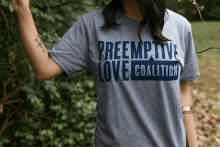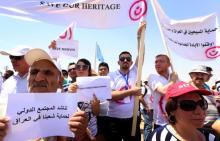jeremy courtney

Former employees at Preemptive Love Coalition, an international relief organization, have alleged that its leaders created an abusive environment. On Dec. 15, Ben Irwin, the organization’s former director of communications and public relations, wrote on Twitter and in subsequent posts to Medium, that Preemptive Love’s founders, Jeremy and Jessica Courtney, “abused, gaslit, threatened, and mistreated dozens of staff over the years.”

Alarm and outrage has been growing over the mounting humanitarian crisis in Iraq at the hands of the Islamic State (IS) also known as ISIL (Islamic State of Syria and the Levant) or ISIS (Islamic State of Iraq and Syria).
Christians in the region are being forced to convert, pay tribute or die as the al Qaeda breakaway group sweeps into predominantly Christian villages and Hamlets in Iraq, sending tens of thousands fleeing for their lives. Other non-Muslim groups, in particular the Yazidi, who practice a faith that predates Islam, are reportedly considered as infidels by the fanatic Islamic State and targeted for extermination in what many are calling a genocide. The U.N. is still gathering numbers but it believes that hundreds of Yazidis have been killed while others, primarily women, have been abducted and taken into slavery. Around 40,000 Yazidis have fled into the mountains of Northwest Iraq where they face the prospect of starvation on mountain or massacre by the Islamic State militants below.
The news is devastating and overwhelming. The suffering and acts of brutal violence staggers the imagination. What would a nonviolent response look like?

When I first saw Americans joining in solidarity with Iraqi Christians through the #WeAreN hashtag and protest campaign, I was encouraged. Our team at Preemptive Love Coalition had been sounding the alarm about the targeted persecution of minorities in Iraq through private emails and social media messages for weeks, in between making urgent appeals in our effort to provide lifesaving heart surgeries for children amid the violence.
Most of our efforts were largely unsuccessful before the “Islamic State” gave Mosul’s Christians an ultimatum to (1) convert to Islam; (2) pay a submission tax; or (3) “face the sword.”
After Islamist militants began marking the homes of Christians in red paint with the Arabic letter “N” (Nazarene) for extermination or expropriation, we tried again to use our proximity to the problem in Iraq to provoke our friends in America to pay attention by tagging a photo “#WeAreN,” in which I had symbolically marked myself with an Arabic “N.”
But it was not strictly an act of solidarity with Iraqi Christians. We had the targeting of Turkmen, Yezidi, Shabak, and even Sunni Muslims in view, as well. #WeAreN was more about the marking of Christians; less about the marking of Christians.
Muslims and minorities across Iraq immediately sensed the gravity of the tactics deployed by the Islamic State: if one group is marked, we are all marked. If we stand by in silence today while others are marked for extinction, our time will come, and there will be no one left to stand for us.
In response, Muslims across Iraq joined together in protest, prayer, and viral photographs saying “We are Iraqi. We are Christians.”
 A few weeks back at the Justice Conference we had the chance to sit down with Jeremy Courtney, cofounder of the Preemptive Love Coalition, to tell the story of his amazing work in Iraq providing heart surgery for children.
A few weeks back at the Justice Conference we had the chance to sit down with Jeremy Courtney, cofounder of the Preemptive Love Coalition, to tell the story of his amazing work in Iraq providing heart surgery for children.
Special thanks to Matthew Willingham and everyone at the Preemptive Love Coalition for providing us with footage from Iraq to tell their story.
The video below is a first in our new series Sojo Stories, where we sit down with individuals to hear their stories about using their talents for the common good.